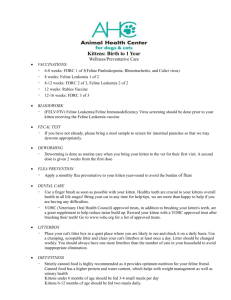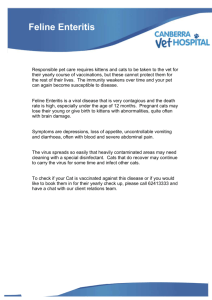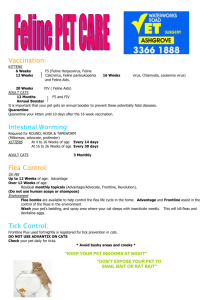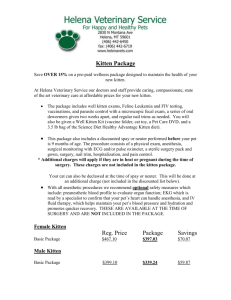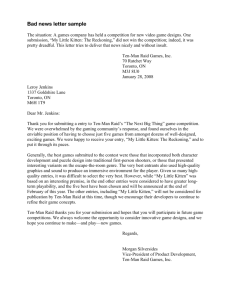Kitten Routine Care and Advice
advertisement
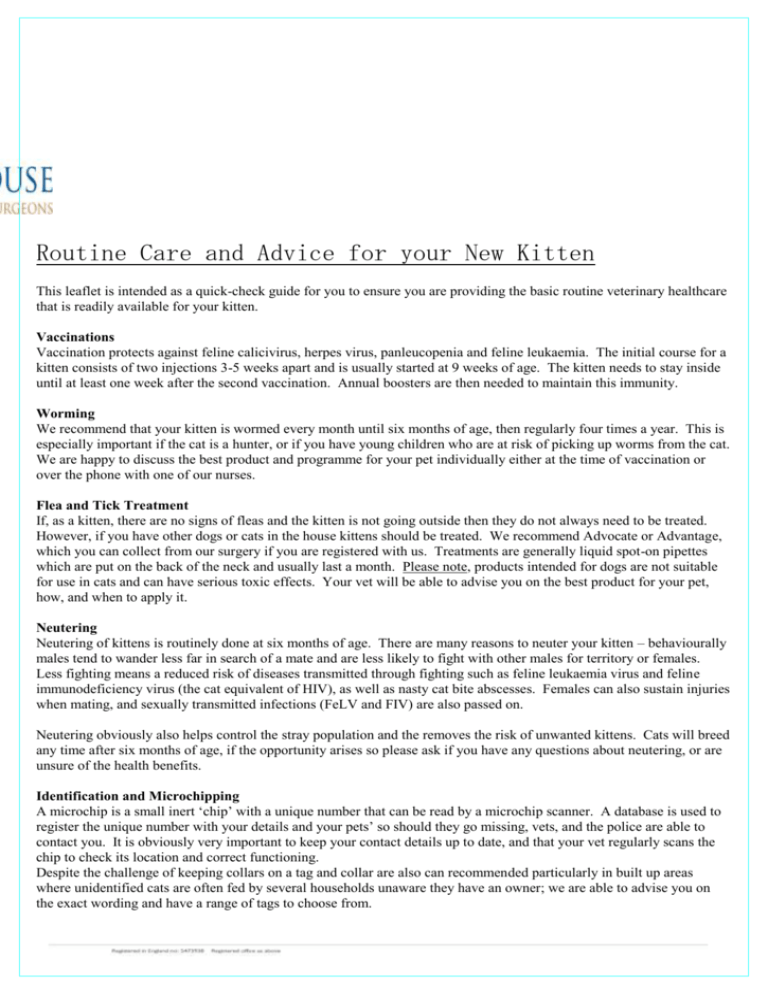
Routine Care and Advice for your New Kitten This leaflet is intended as a quick-check guide for you to ensure you are providing the basic routine veterinary healthcare that is readily available for your kitten. Vaccinations Vaccination protects against feline calicivirus, herpes virus, panleucopenia and feline leukaemia. The initial course for a kitten consists of two injections 3-5 weeks apart and is usually started at 9 weeks of age. The kitten needs to stay inside until at least one week after the second vaccination. Annual boosters are then needed to maintain this immunity. Worming We recommend that your kitten is wormed every month until six months of age, then regularly four times a year. This is especially important if the cat is a hunter, or if you have young children who are at risk of picking up worms from the cat. We are happy to discuss the best product and programme for your pet individually either at the time of vaccination or over the phone with one of our nurses. Flea and Tick Treatment If, as a kitten, there are no signs of fleas and the kitten is not going outside then they do not always need to be treated. However, if you have other dogs or cats in the house kittens should be treated. We recommend Advocate or Advantage, which you can collect from our surgery if you are registered with us. Treatments are generally liquid spot-on pipettes which are put on the back of the neck and usually last a month. Please note, products intended for dogs are not suitable for use in cats and can have serious toxic effects. Your vet will be able to advise you on the best product for your pet, how, and when to apply it. Neutering Neutering of kittens is routinely done at six months of age. There are many reasons to neuter your kitten – behaviourally males tend to wander less far in search of a mate and are less likely to fight with other males for territory or females. Less fighting means a reduced risk of diseases transmitted through fighting such as feline leukaemia virus and feline immunodeficiency virus (the cat equivalent of HIV), as well as nasty cat bite abscesses. Females can also sustain injuries when mating, and sexually transmitted infections (FeLV and FIV) are also passed on. Neutering obviously also helps control the stray population and the removes the risk of unwanted kittens. Cats will breed any time after six months of age, if the opportunity arises so please ask if you have any questions about neutering, or are unsure of the health benefits. Identification and Microchipping A microchip is a small inert ‘chip’ with a unique number that can be read by a microchip scanner. A database is used to register the unique number with your details and your pets’ so should they go missing, vets, and the police are able to contact you. It is obviously very important to keep your contact details up to date, and that your vet regularly scans the chip to check its location and correct functioning. Despite the challenge of keeping collars on a tag and collar are also can recommended particularly in built up areas where unidentified cats are often fed by several households unaware they have an owner; we are able to advise you on the exact wording and have a range of tags to choose from. Diet There are a huge range of sources and an increasing number of cat foods available including age specific diets, weight loss diets (should these become necessary) and those to help with specific long term diseases. Our vets and nurses are able to advise you on the most suitable diet for your pet. Remember; always change diets gradually over at least one week. Insurance Unfortunately there is no NHS for pets, the steady advances in veterinary medicine and surgery are reflected by the increased levels of care and treatment available, but this also means £5,000 vets’ bills are becoming less and less uncommon! Pet insurance is available to help with the cost of veterinary fees, as with car or house insurance there are many different companies, policies and levels of cover so it is important to compare and read the small print to make an informed choice. Please do not hesitate to ask any questions.

